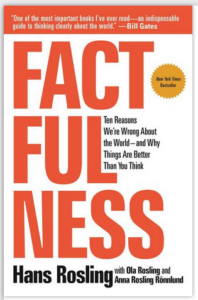Over the past two months the HBG Book Club has been reading Hans Rosling’s Factfulness and, considering what’s going on in the world around us right now, the timing couldn’t have been more perfect. I asked my colleague and fellow book clubber Jayme Klein to share her perspective about the book for our blog in today’s article. Thanks, Jayme! ~Helen
People often call me an optimist, because I show them the enormous progress they didn’t know about…I’m not an optimist…I’m a very serious ‘possibilist…,’ someone who neither hopes without reason, nor fears without reason, someone who constantly resists the overdramatic worldview. As a possibilist, I see all this progress, and it fills me with conviction and hope that further progress is possible.” -Hans Rosling
During April and May, the Helen Brown Group Book Club read Factfulness: Ten Reasons We’re Wrong about the World- and Why Things are Better Than You Think by the late Hans Rosling. While our meetings are always virtual, spanning homes and offices across the globe, these gatherings felt different. We were all at home universally quarantined.
As we logged in each week, we admired the various Zoom backgrounds that book club members had chosen. All of them were drastically different places than our kitchen, office or living room. They sparked conversations about personal interests, old vacations, or something calm and pleasant to look at.
No matter what the background, we all had a desire to go somewhere else, to stop focusing on the current struggles all of us were a part of in the pandemic. Many of us expressed overwhelm with the deluge of Covid-19 news. As we dove into the book and started to look at our thoughts more objectively with Rosling’s guidance, it became clear how much our backgrounds and belief systems shape our worldviews.
Rosling had a decades-long career in medicine and international health. Through anecdotes highlighting his own bias, he showed the challenges and rewards of changing viewpoints after experiencing different cultures and opinions.
By describing 10 instincts that affect how we see data, Rosling explained how those beliefs, and how data is shaped by them – keep us from seeing how much progress civilization has truly made in the past few centuries. We learned that although some of what shapes our thoughts and feelings are unique and personal, some of these are more universal and deep-rooted than we may have thought.
His “Factfulness Rules of Thumb” deftly summarized the book with hints that would prove helpful no matter what the situation when faced with personal or professional interpretation. I’ve adapted them for our prospect research needs:
- Look for the Majority: Sometimes looking between categories is where the largest common denominator is. For example, alumni, parents, and staff all have the same thing in common: a relationship with the school. While the nature of the relationship may differ, the school still holds value for all of them.
- Expect Bad News: It is easier to find a negative story than a positive one about a prospect. Keep digging and see what else exists about them beyond something sensational. When reading negative contact reports, look at the history of the prospect’s relationship with the organization. Was the negativity related to a person or story? Was it an outlier amongst years of positive contacts?
- Resist the straight line. Lines might bend: Sometimes the prospect with the highest net worth may not be the best. Look for other data trends that show a dedication to your cause, such as consistent giving and regular, positive interactions.
- Calculate the Risks: How much work will a project take to get the results that your team needs? Is the new, shiny resource going to help your workflow?
- Get things in proportion: Is the prospect’s million-dollar house the biggest in town, or just a small cottage in a high-wealth area?
- Generalization: Just as Rosling advised in the first point, resist the urge to assume that your top prospect is the wealthiest. What categories do you automatically consider? What lesser-considered factors could help you identify someone?
- Slow change is still change: Our field is constantly evolving, and it sometimes takes time to adapt. Learning a new resource, evaluation technique or piece of software isn’t easy, but is always valuable. Give yourself credit for adapting- no matter how small it may seem.
- Get a toolbox: Keep a running list of resources to help you in your work. HBG regularly updates our list with input from staff. Additional lists, such as APRA’s, can further guide your work.
- Resist blame: Why didn’t you get the results you wanted? Maybe the search criteria for a foundation search was too specific for a long list of funders. Think about how you can change the keywords, loosen the search terms, or re-examine the request to find better results.
- Take small steps: Faced with an overwhelming list of prospects to screen? Try sorting the results in different ways to reveal different population segments. Using variables such as confirmed assets, number of philanthropic gifts given or the prospect’s largest gift could reveal new and interesting prospects.
In an industry such as ours, facts are paramount to our success. Rosling’s book helped us look more objectively at how data is presented to us, as well as how we take it in and use it in our work. We highly recommend it, especially now, if you’re interested in how data is presented to us and how our perspectives change how we receive it.

